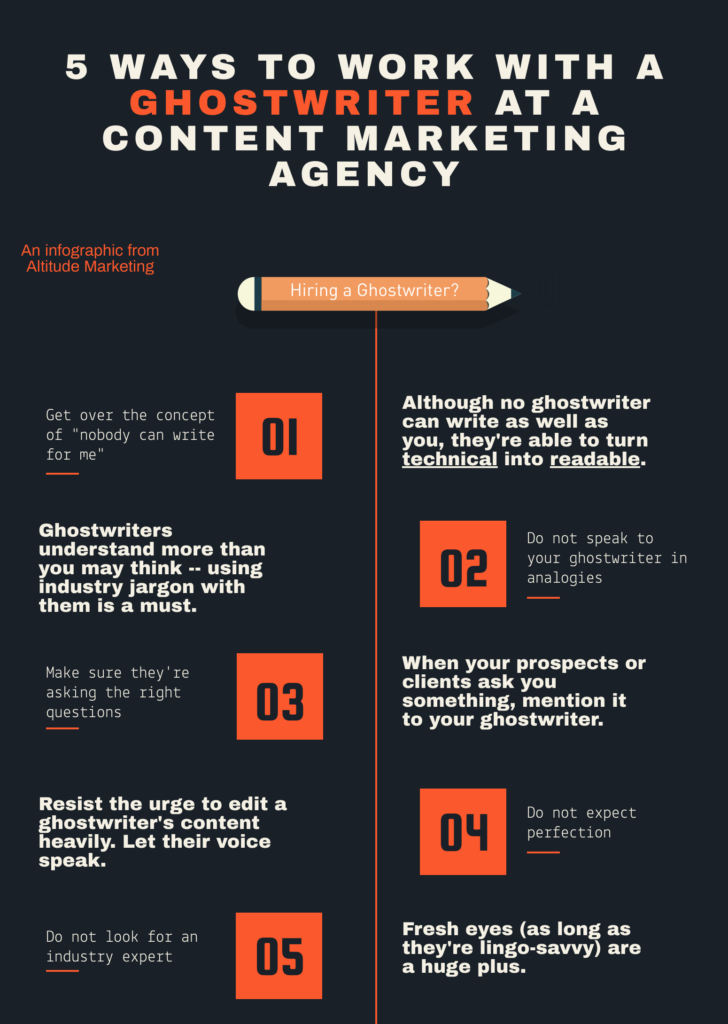There are plenty of reasons business owners and marketing folks want to create content. It’s great for SEO. It’s good for showing off your smarts. It even works for building credibility and thought leadership.
All super important things.
Problem is, most CEOs, CTOs, CIOs, CFOs – the list goes on – don’t have the time or ability to create good content. Most aren’t professional writers, after all. And if they are, they’re probably not able to write what their audience actually wants.
(We’ll get to that in a second.)
Take “celebrity-written” books, for example. At least 60% of those autobiographies, cookbooks, how-to’s and tell-alls are, in fact, ghostwritten.
That’s why working with a ghostwriter shouldn’t be seen as taboo or as “taking a shortcut.” It’s actually a great strategy for those folks who don’t have the time or skill to chug out quality content.
Of course, working with a ghostwriter isn’t always easy for business leaders. Here are five tips for effectively using a ghostwriter at a content marketing agency.

Tip # 1: Get Over the Concept of “Nobody Can Write for Me”
When you’re neck deep in your business, you inevitably understand it better than anyone else.
That’s great. But it doesn’t mean “nobody can write for you.” In fact, the truth might actually be the opposite.
When you’re close to something, it’s tough to write readable, enjoyable and understandable content about it. Business leaders – especially technical ones and scientists – love to go down rabbit holes and create rambling, weedy pieces that simply won’t engage most prospects.
So yes, it’s true that no ghostwriter can express your thoughts as well as you. But that’s fine. You’re not creating content for you. You’re creating content for your audience.
One of the most important roles a content marketing ghostwriter plays is translating your ideas for a lay audience. They need to turn technical into readable. You shouldn’t expect them to be an expert like you, but they can often express your ideas to someone who isn’t as smart as you. Their job depends on it.
(There are limits, of course. When working with a ghostwriter at a content marketing agency, you should never outsource true white papers, product manuals and other extremely technical content. That’s where you and your engineers come in.)
Tip #2: Don’t Speak to Your Ghostwriter in Analogies
A lot of technical business owners tend to equate their knowledge to something ghostwriters would better “understand” in real life.
Here’s the problem with that.
When you use analogies to try to explain things to ghostwriters, they aren’t picking up on important industry jargon they need to hear.
Why is this a big deal? It stops them from being able to translate your technical language into readable content.
Which means less interest in your company.
Which is a bad thing.
Even if you don’t think they understand, they probably understand more than you give them credit for.
Tip #3: Make Sure They’re Asking the Right Questions
If your potential ghostwriter doesn’t sound a little bit like a buyer, redirect the conversation.
Remember: It’s a give and take exercise. You need to feed them what they need to be successful, particularly if they’re not of, by and for the industry. At first, especially, they’re simply not going to know every question to ask. Help them along, and it will pay dividends for years.
Tip #4: Don’t Expect Perfection
In fact, you should revel in their lack of perfection.
If you work with ghostwriters for the sole purpose of translating your brain for lay peoples’ perspectives, the worst thing you could possibly do is edit their work heavily.
You should absolutely make sure it’s correct and accurate. But don’t rework it entirely. It should still have its original integrity, tone and flow. Remember, you’re not writing for you.
The point of hiring a ghostwriter at a content marketing agency is to:
- Increase bandwidth;
- Trust that they’re able to turn you into something engaging for a typical reader in the space.
No matter what your opinion on the matter is, your heavy editing does end up making the content more complex and difficult to read. That’s just what you subject matter experts do.
Don’t be ashamed of your brilliance. Just allow someone to rein it in and make everything sound better.
Tip #5: Don’t Look For an Industry Expert
Some content marketing agencies focus exclusively on one industry. The issue with specializing is that you end up falling into those same traps of unconscious bias.
The fresh eyes of a general ghostwriter (so long as they have technical acumen) are a huge benefit. Of course you want them to have an understanding of what you do. But if they live in your world, they’ll end up being less effective. There’s no way around that.
An outsider’s perspective is key. They’re more curious, ask more questions and can turn a dense piece of subject matter into an entertaining read for any type of audience.
What can you take from all of this?
Think of a ghostwriter as a layer of insulation for you. They allow subject matter experts to do their thing while dramatically amplifying the way your message gets across to both readers and viewers alike.
B2B business leaders may be thinking, “They can’t write for us or make it sound like me.” News flash: It doesn’t need to sound like you. As long as things are on brand, their style is completely fine.
If you follow these five ways to work with a ghostwriter at a content marketing agency, you’ll be well on your way to creating quality content for days.
By the way, this piece was ghostwritten by a member of our content marketing team. Looking for the perfect team to help you churn out quality, B2B marketing content for your business? That’s our speciality. Contact us or call 610-421-8601 x122 to get in touch with one of our marketing experts today.



